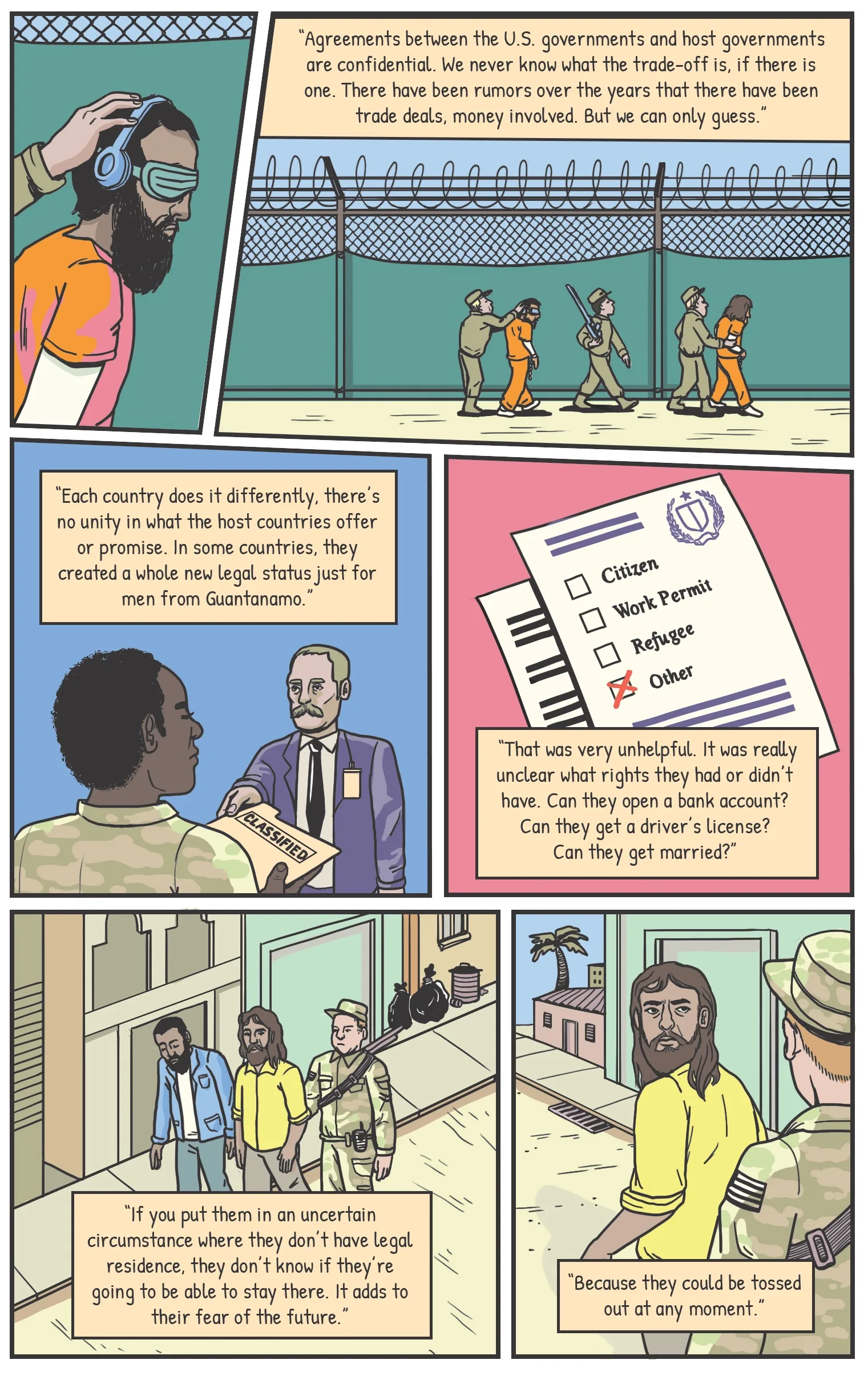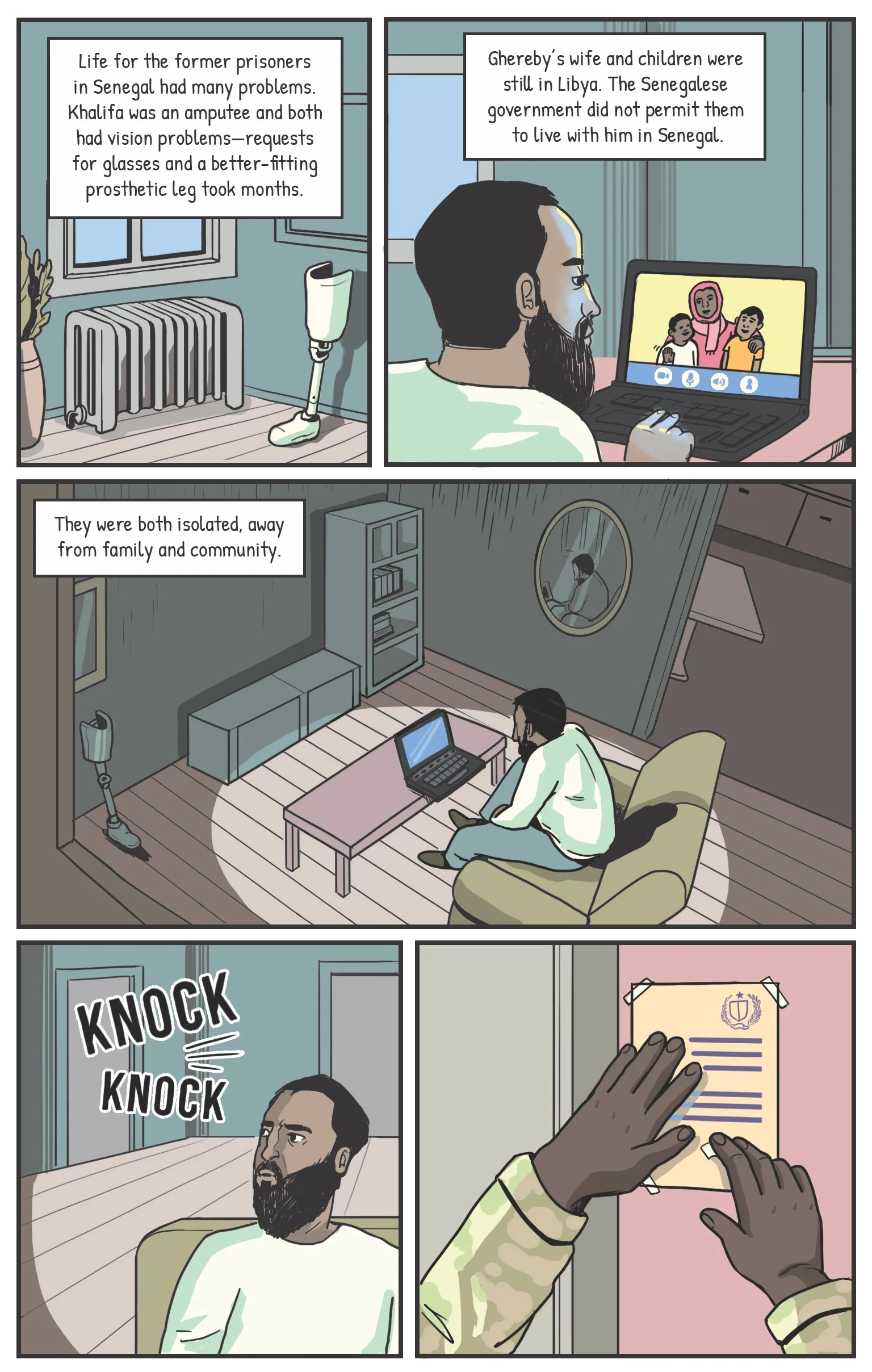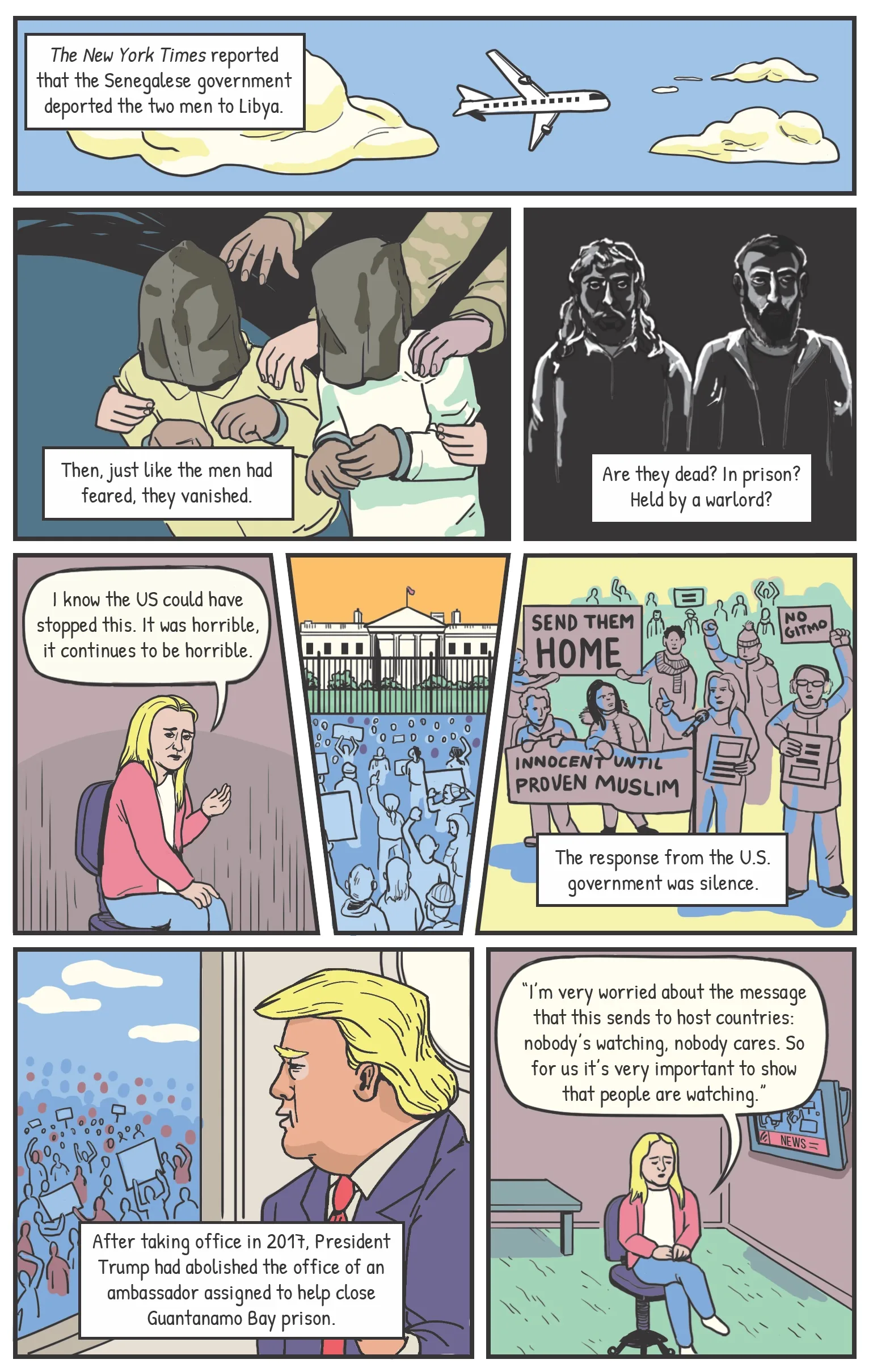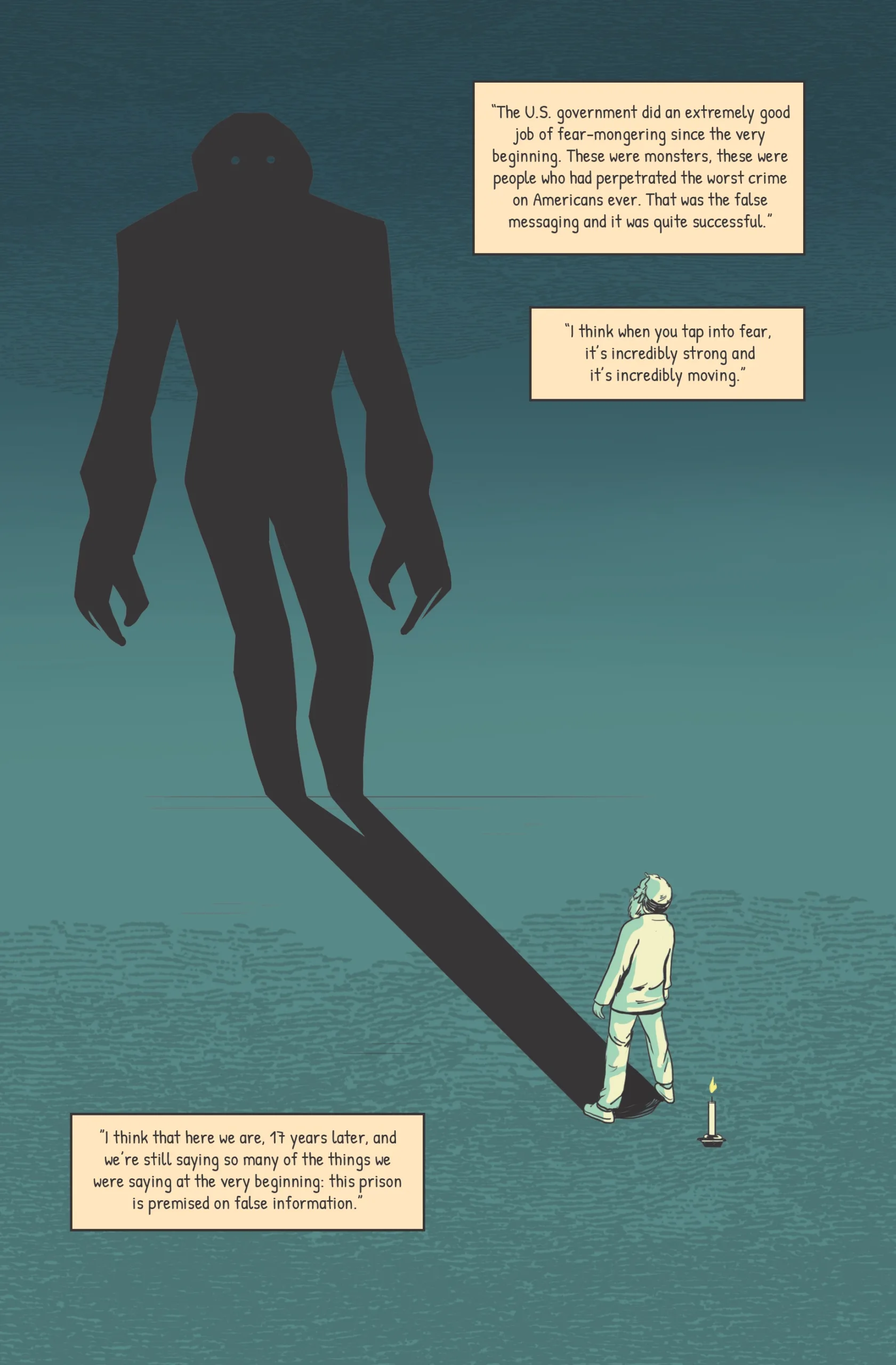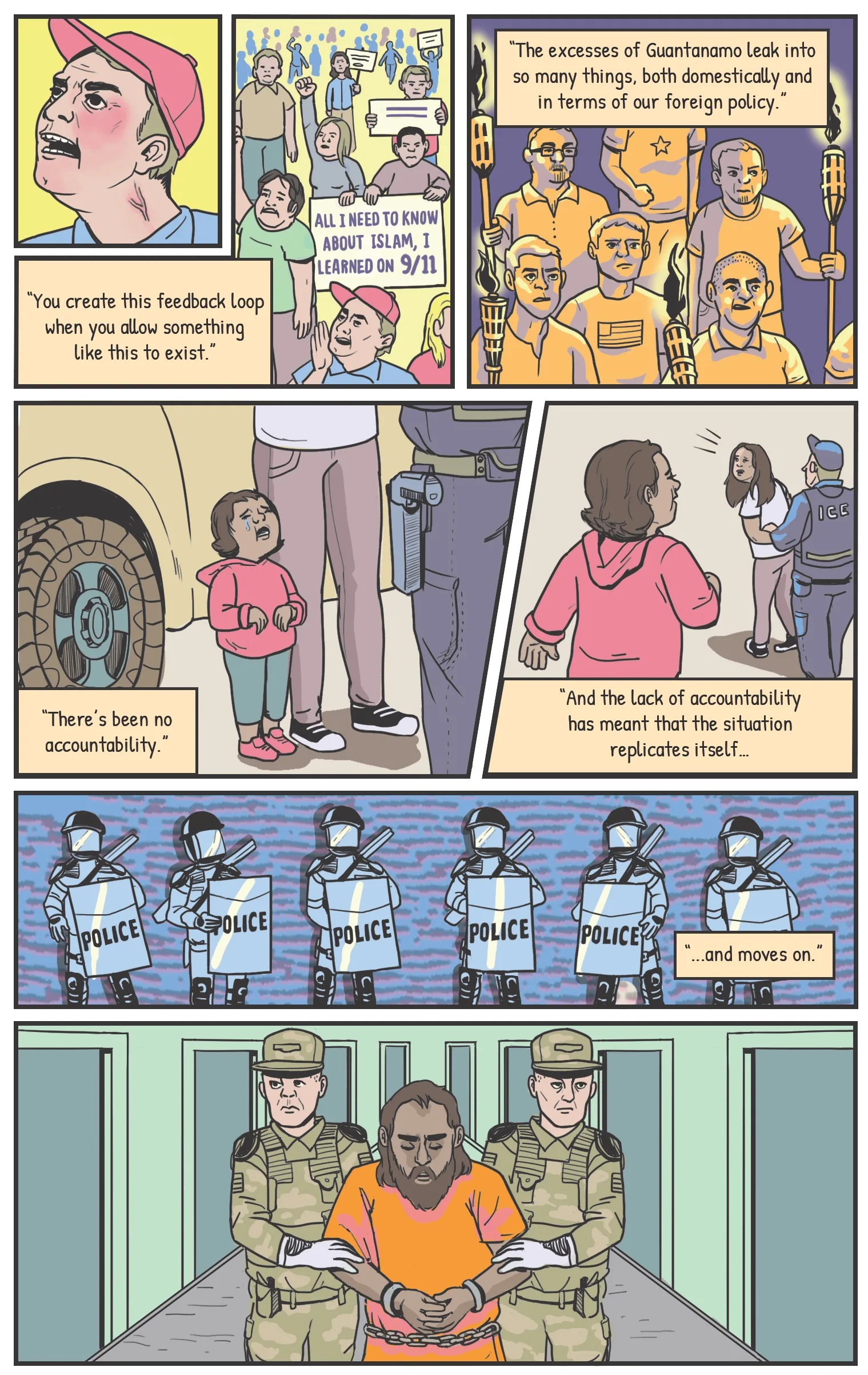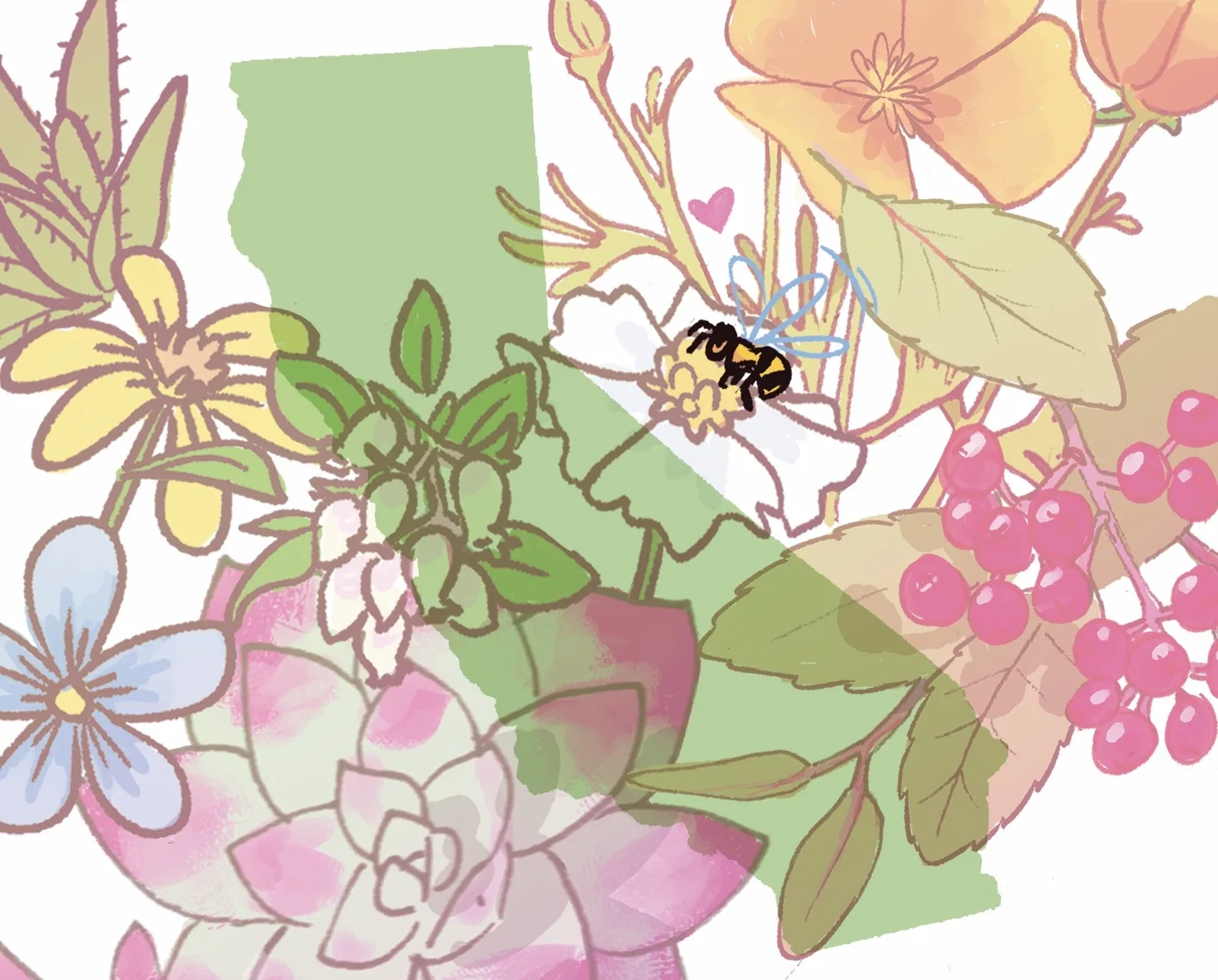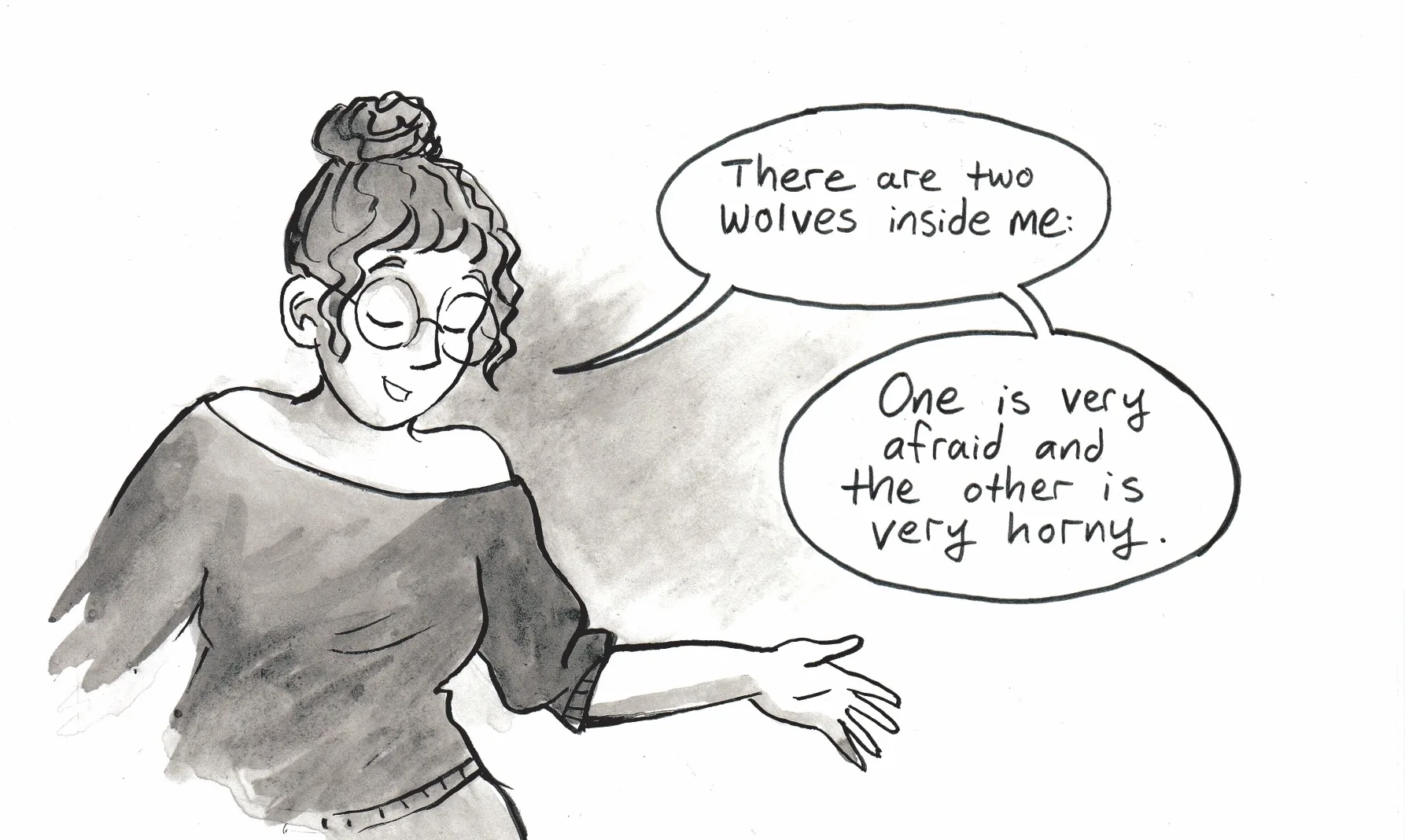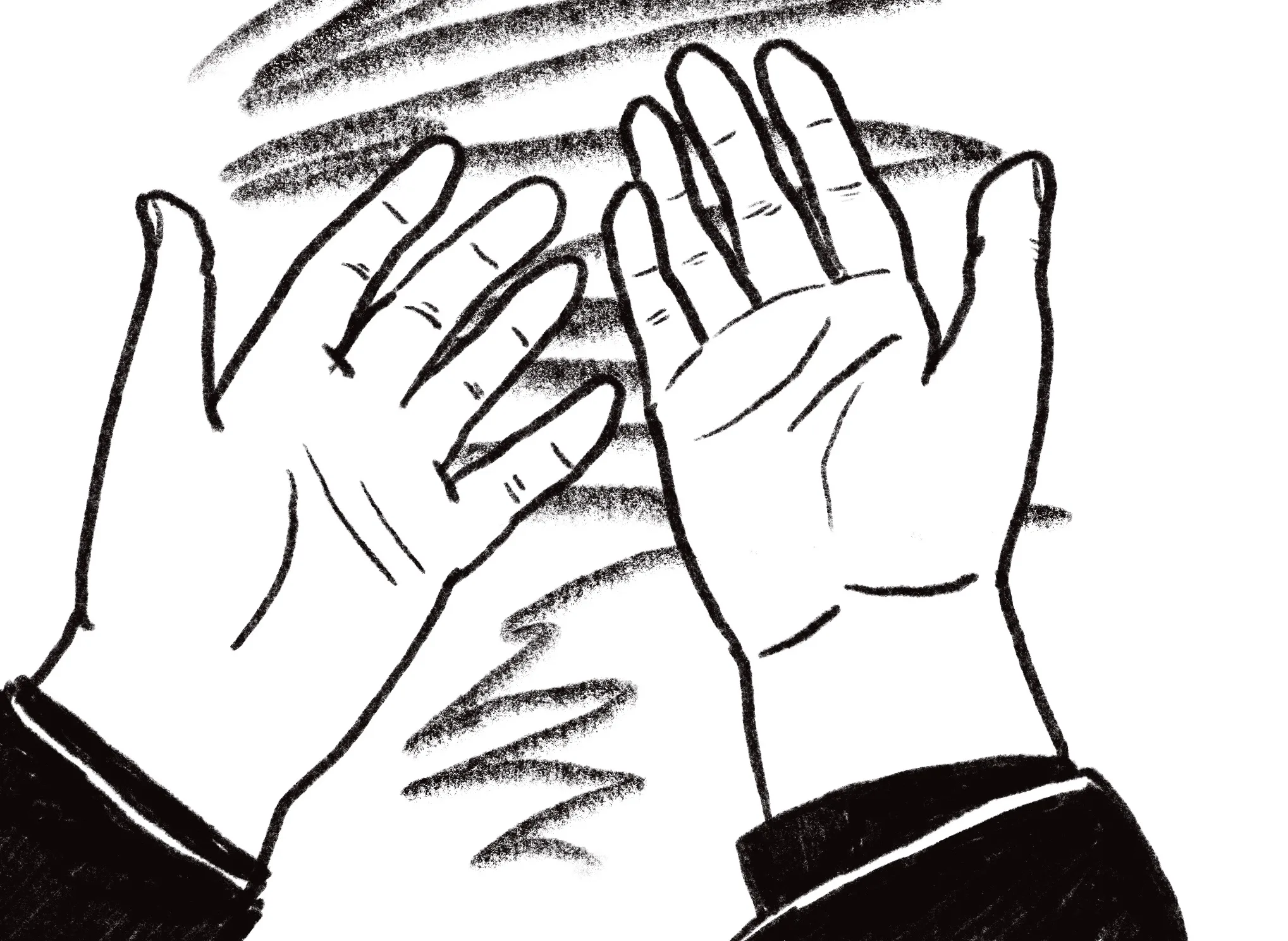In light of the Trump Administration's directive in January 2025 to start imprisoning thousands of migrants at Guantanamo Bay, we are publishing an excerpt from the 2020 book Guantanamo Voices: True Accounts from the World's Most Infamous Prison, which illustrates interviews with 10 people who have experience at the prison.
This chapter from the 2020 book is an interview with Katie Taylor, who at the time worked for human rights group Reprieve providing support for former Guantanamo prisoners. Since 2002, roughly 780 men have been imprisoned in Guantanamo Bay and the vast majority were never charged with a crime. As of February 2025, 15 people remain incarcerated at the prison and President Trump's directive calls for imprisoning up to 30,000 migrants at the facility. Even after people are released from Guantanamo, the painful impacts of their incarceration endure.
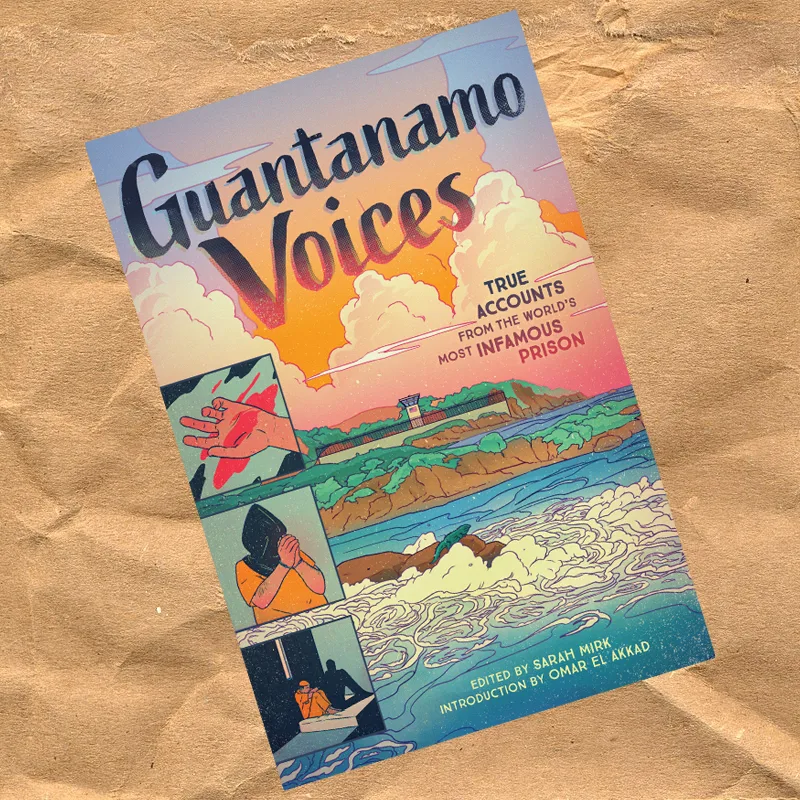
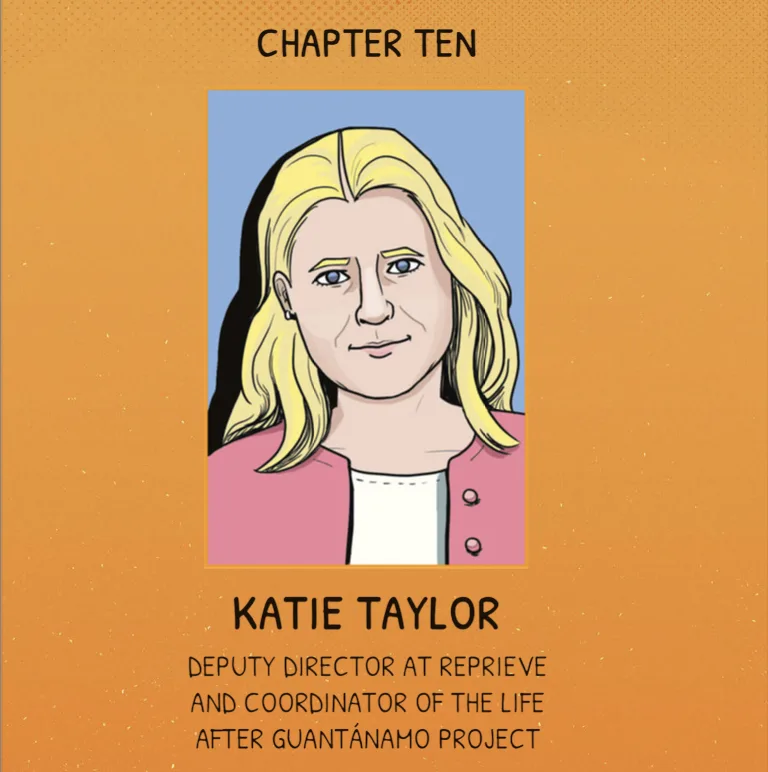
![Panel one Lines of Arabic on a page. The word spells out “salam” (peace). سلام Panel two Katie’s finger traces the word. Panel three Katie as an 18-year-old college student wearing a Brown University sweatshirt. She is a white woman with sandy-blonde hair. She’s reading an Arabic language textbook on her dorm room bed. She says the word out loud. Katie [narration]: “Arabic just always appealed to me. The script is really pretty.” Katie: Salam. Panel four Katie walking around the leafy New England Brown campus, thinking the Arabic word, looking happy and excited. Panel five In contrast to that green and leafy scene, Katie walking down a hot street in Haifa, outside the Adalah office. It’s clearly a different climate: there’s a palm tree and road signs in Hebrew. Katie: [narration] “After graduation, I got an internship at the Legal Center for Arab Minority Rights in Israel.”](https://www.crucialcomix.com/wp-content/uploads/2025/02/guantanamo_p1-2.webp)
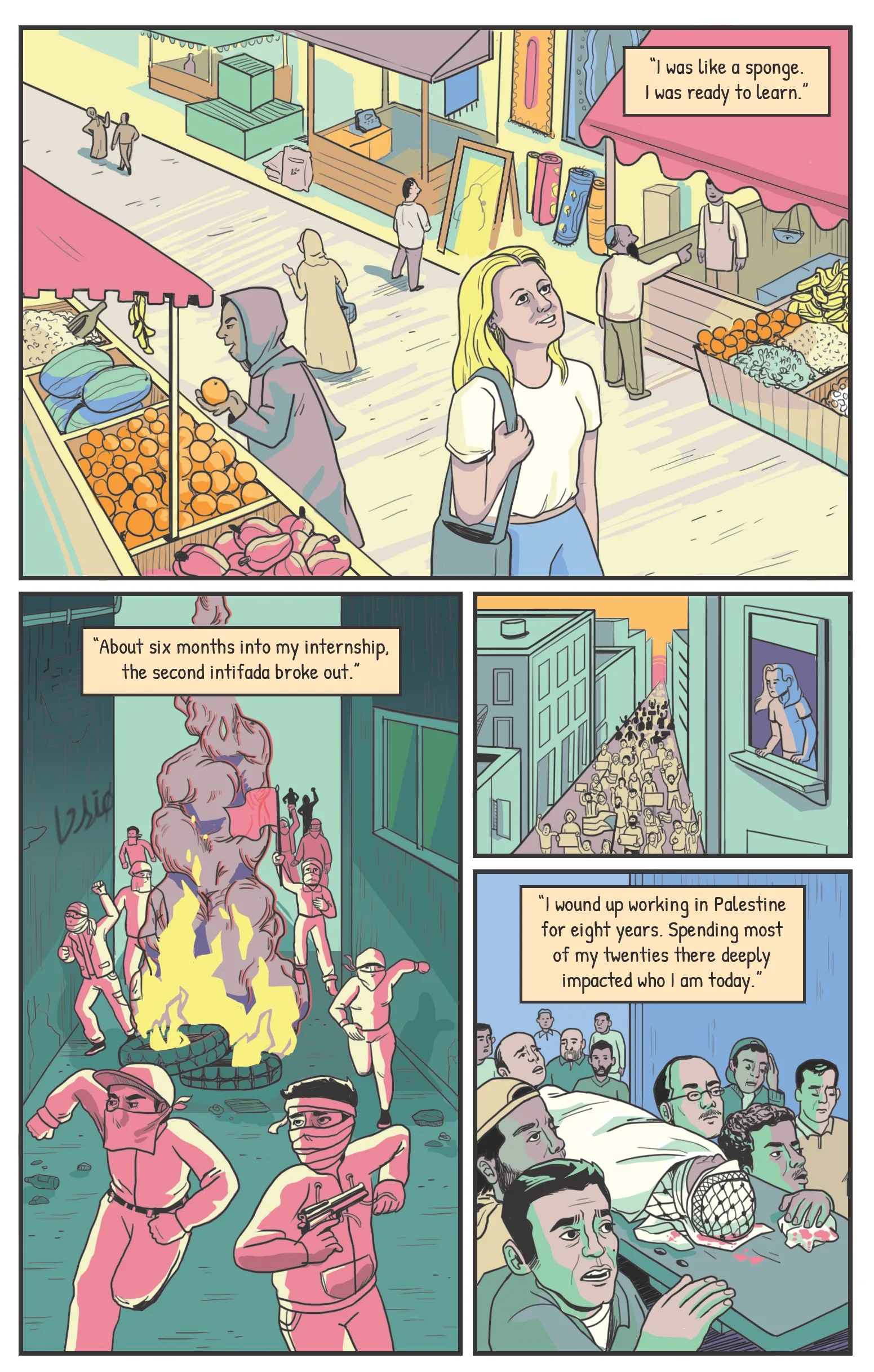
![Panel one Katie in her Reprieve office, talking, modern day. Narration: In 2009, when President Obama announced he would close Guantanamo, human rights organization Reprieve got UN funding to start the Life After Guantanamo program. Katie was hired in 2010. Katie: “If you’re released, it’s not like you step out of Guantanamo and suddenly all of that is behind you and you’ve forgotten it.” Panel two Katie talking on the phone with a client. Katie [narration]: “I think I expected the men to be angrier.” Katie: Okay, tell me what’s going on. Panel three Katie thinking as she listens on the phone. Over the rest of this page, the phone cord from Katie’s phone twists around the page, becoming a complicated, knotted path that travels around a globe with flags marking host countries. Katie [narration]: “A lot of what we do in Life After Guantanamo is shockingly mundane.” Katie: Alright, let me see if I can get someone to your house to install WiFi. Panel four Katie [narration]: “The US government resettled many [detainees] in third-party “host” countries, so many of them are having to rebuild their lives in countries they’d never even set foot in before.” Panel five Katie: “They didn’t speak the language, they didn’t know how to navigate the basic institutions that we use-day to-day. They were just left and expected to get on with their lives.”](https://www.crucialcomix.com/wp-content/uploads/2025/02/guantanamo_p4.webp)
![Katie sitting in her kitchen at home, eating dinner. Katie: “If you’ve only been dealing within the confines of an arbitrary prison system, it orders the way that you think about the world.” Panel 2 The lights flip off, leaving her in the dark. Katie: “Yesterday, my electricity went out. You don’t really think about it, you just deal with it.” Katie: Oh dang, must be the fuse. Panel 3 A detainee holding a candle in a dark kitchen, very upset. Katie [narration]: “Whereas a torture victim or someone who has been detained indefinitely might think..” Detainee: “What have I done to make this happen?! Why are they doing this to me?!” Panel 4 That same detainee walking down a street in Europe, looking upset and confused. Narration: A core part of the “regime of control” at Guantanamo was to make it impossible for detainees to trust their sense of reality. Panel 5 Narration: This creates a profound sense of paranoia and uncertainty. The detainee seeing his reflection in a CCTV camera.](https://www.crucialcomix.com/wp-content/uploads/2025/02/guantanamo_p5.webp)
![Panel one A man in Senegal calling on a cell phone, in the middle of the busy city of Dakar. Katie [narration] “In 2016, I remember the day very well. Suddenly, we were getting calls from former Guantanamo detainees from all over the world.” Man: “Hello? Hello? Reprieve?” Panel two Behind the man, a scene of a car accident in the street. Man: “There has been an accident. Someone said to call you.” Panel three Portraits of Salem Abdul Salem Ghereby and Awad Khalifa, with labels. Narration: That’s how Katie and her colleagues first got in contact with two Libyan former detainees living in Dakar. Panel four Scene of bombed-out Tripoli. Narration: While Ghereby and Khalifa had been in Guantanamo, their home had entirely changed. During the Arab Spring, Libyans staged a revolution against dictatorship. It descended into a bloody civil war, with rival factions fighting brutally on all sides. Panel five Khalifa looking through the small window in the door of his cell. Narration: In 2016, as Obama scrambled to transfer prisoners out of Guantanamo, the U.S. government gave the two men a choice: stay in the prison indefinitely or be sent to Senegal.](https://www.crucialcomix.com/wp-content/uploads/2025/02/guantanamo_p6.webp)
